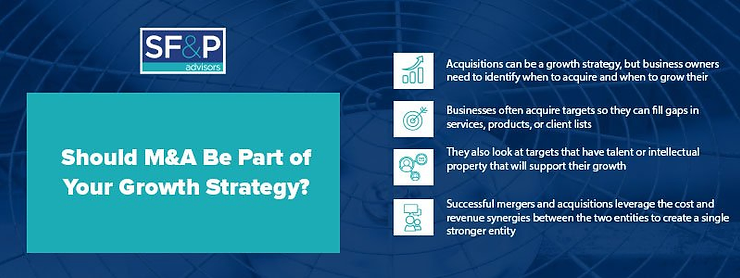7 ways to grow your plumbing or HVAC business through acquisitions

There is a lot of activity in the mergers and acquisitions space, and there is likely to be a lot more in the very near future. While mergers between big multinationals tend to grab the headlines, there is a significant volume of transactions occurring between Main Street businesses, and the opportunities for acquisitions will continue to grow as more Baby Boomers prepare to retire.
Over half of all businesses are owned by people over the age of 50, and they are expected to sell about $10 trillion worth of assets or 12 million businesses between 2020 and 2040. This creates the perfect environment for small business owners who want to expand their businesses through strategic acquisitions.
But how do you know when you should move forward with an M&A growth strategy instead of relying on steady, methodical, organic growth? This guide is designed to help steer you in the right direction by looking at seven of the most effective ways businesses use acquisitions as part of their growth strategy.
1. Filling gaps in service or product offerings
As the marketplace changes, businesses need to expand the products and services they offer if they want to stay competitive. In some cases, it is easier and more advantageous to acquire a company that offers the desired product or service rather than adding it to your business’s offerings.
For example, an HVAC company that wants to offer plumbing services may be able to save time and resources by acquiring or merging with a plumbing company rather than investing in the supplies, training, and recruiting necessary to add those services to its own menu.
2. Expanding client lists
In some cases, businesses acquire others because they want to fill gaps in their client lists and the target company has a must-have client. This can ratchet up the cost of the target company, but it may be worth it for the long-term value gained by the new client(s).
3. Acquiring new products to scale
If another company has a product that you want to sell, you may want to acquire that company so you can scale the product. This acquisition strategy tends to be most effective when the target company has an innovative product or service that hasn’t been widely released and the acquiring company has the distribution channels, the sales force, or the market to scale the product.
4. Acquiring talent and intellectual property
When you acquire a business, you don’t just get its physical assets, products, and services. You also obtain many intangible benefits, such as talent and intellectual property. Acquiring a competitor’s intellectual property can often be the quickest path to market dominance, and acquiring talented staff can save you a lot of time and capital on recruitment, training, and onboarding.
5. Leveraging synergies
The way two businesses work together creates synergies that can be used to improve operational performance. If you have overlapping operations or resources with the target company, you can eliminate redundancies and save money by consolidating your efforts. For example, you may be able to eliminate facilities or departments. On the flip side, you can also use your increased size to negotiate better terms with your vendors.
This synergy can also be used to increase revenue. Mergers and acquisitions reduce competition, open new territories, and provide access to new markets. You can also expand your customer base and develop new sales opportunities by cross-selling or offering new products and services.
6. Saving time and reducing learning curves
By acquiring businesses that have skills, products, and services you want to offer, your business saves time on research and development costs. You can also save time and reduce the learning curve associated with new technology, different workflows, and unfamiliar processes.
Ultimately, you have to decide if the value of acquiring those elements from another company is worth more than the challenges of acquisition, such as rebranding or ensuring you have the right cultural fit.
7. Tapping into private equity firms
While many business owners clearly see the potential of growing their businesses by acquiring another business, they often don’t realize that allowing their business to be acquired can also be a growth strategy. Acquisitions take a variety of different forms, and they don’t always involve another company cutting you a check so you can walk away from the business.
In many cases, private equity firms purchase businesses and keep the owner onboard. Typically with these transactions, you receive a check that is a portion of the purchase price, and the rest of the purchase price goes into the equity firm. When the firm is ready to exit, you get those funds back plus any money they have earned while in the equity firm.
Through this acquisition, your business gets to grow because it’s backed by the resources of the equity firm. At the same time, you also enjoy the opportunity to grow your capital.
Business owners have a number of strategic reasons for acquiring other companies, merging with other businesses, or letting their own companies be acquired. However, in some cases, business owners acquire another business because they see potential and know they can turn it into a winner. If you’re ready to grow, acquisitions may be the right answer, but you need a trusted advisor to steer you through the process.
Contact SF&P Advisors
If you want to explore the potential to grow your business through M&A, let us help. At SF&P Advisors, we focus on mergers and acquisitions in the plumbing and HVAC industry. We would love to talk with you about the value of M&A as a growth strategy — contact us today so we can answer your questions and provide you with a no-cost evaluation of your business.
